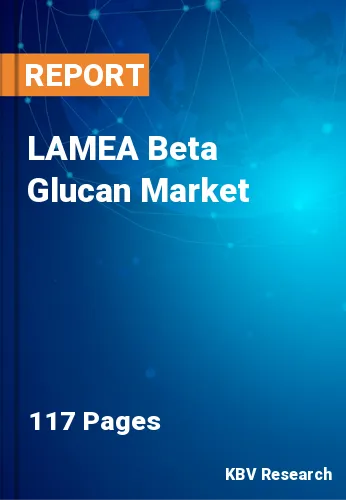The Latin America, Middle East and Africa Beta Glucan Market would witness market growth of 9.6% CAGR during the forecast period (2023-2030).
Beta-glucans, as soluble fibers, contribute to digestive health. Their incorporation into various food and beverage products, including cereals, energy bars, and functional beverages, caters to consumers seeking options that promote gut function and overall well-being. Beta-glucans, sourced from fungi or plant-derived materials like oats, align with the plant-based and clean-label movements. As consumers increasingly prioritize plant-based diets and demand transparency in product labels, beta-glucans become attractive ingredients in developing clean, plant-powered products.
Beta-glucans’ ability to penetrate the skin and stimulate collagen production has led to their integration into cosmetic and skincare formulations. Products enriched with beta-glucans are promoted for their moisturizing and anti-aging properties, catering to consumers seeking natural and effective solutions for skincare. The cosmetic industry’s adoption of beta-glucans aligns with the clean beauty movement, emphasizing natural and sustainable ingredients. Beta-glucans contribute to developing skincare products that meet the growing demand for clean and ethically sourced formulations.
The increasing emphasis on preventive healthcare has prompted consumers to seek products that offer health benefits beyond basic nutrition proactively. Beta-glucans, with their immune-boosting and cholesterol-lowering properties, align with this preventive health focus, driving their adoption in various consumer products. Rising consumer awareness about the health benefits of beta-glucans, supported by educational initiatives and marketing efforts, has played a crucial role in their adoption. As consumers become more informed of the consequences of their dietary and lifestyle choices, the demand for beta-glucan containing products is likely to increase.
Customers in the UAE can easily obtain various health and wellness products, including those containing beta-glucans, through e-commerce platforms. Beta-glucan producers can leverage these features, allowing consumers in the UAE to subscribe to regular deliveries of beta-glucan products, promoting consistent usage for health benefits. The prevalence of smartphones in the UAE makes mobile commerce a significant aspect of e-commerce. As per the International Trade Administration, the United Arab Emirates leads the Gulf Cooperation Council in eCommerce sales, which surged by 53% in 2020 to a record $3.9 billion, or 10% of overall retail sales. The Dubai Chamber of Commerce and Industry signifies that eCommerce will develop $8 billion in sales by 2025 as the UAE region has nearly 100% internet and mobile phone penetration. Thus, due to these aspects, the market will expand across the LAMEA region in upcoming years.
The Brazil market dominated the LAMEA Beta Glucan Market, by Country in 2022, and would continue to be a dominant market till 2030; thereby, achieving a market value of $18,717.2 Thousands by 2030. The Argentina market is exhibiting a CAGR of 10.2% during (2023 - 2030). Additionally, The UAE market would experience a CAGR of 9.2% during (2023 - 2030).
Free Valuable Insights: The Worldwide Beta Glucan Market is Projected to reach USD 897.3 Million by 2030, at a CAGR of 7.7%
Based on Vertical, the market is segmented into Food & Beverages, Animal Feed, Personal Care & Cosmetics, Pharmaceuticals and Others. Based on Source, the market is segmented into Cereal, Yeast, Seaweed, and Mushroom. Based on Type, the market is segmented into Soluble and Insoluble. Based on countries, the market is segmented into Brazil, Argentina, UAE, Saudi Arabia, South Africa, Nigeria, and Rest of LAMEA.
By Vertical
By Source
By Type
By Country
Our team of dedicated experts can provide you with attractive expansion opportunities for your business.

